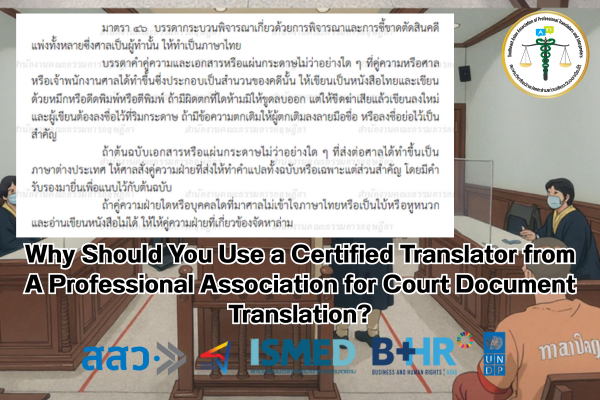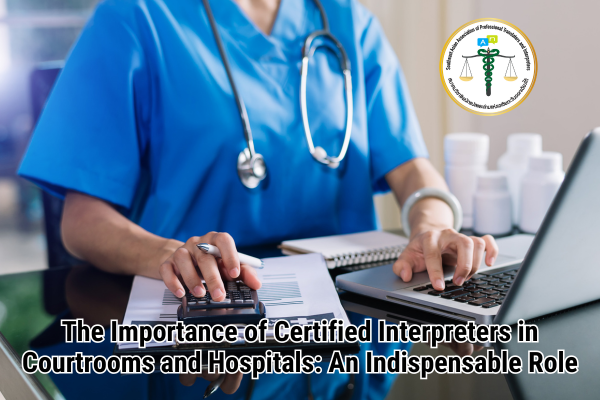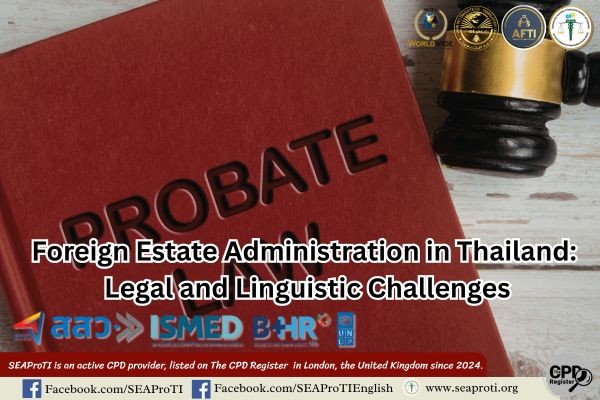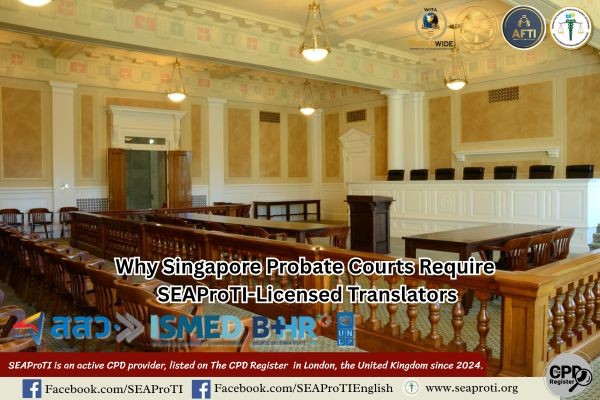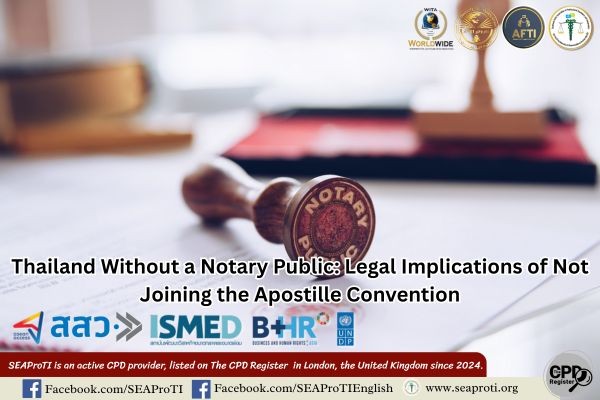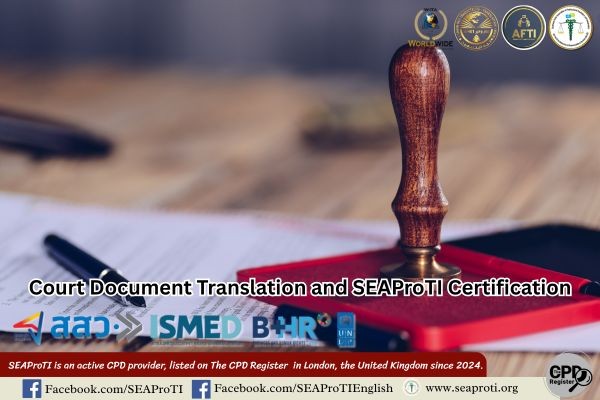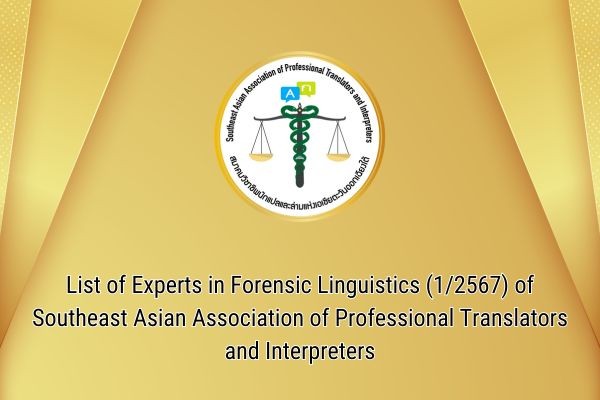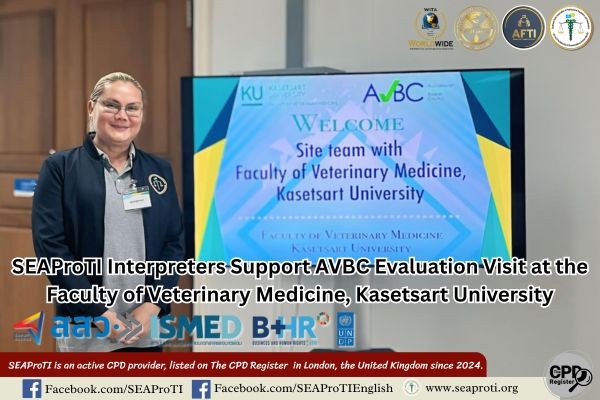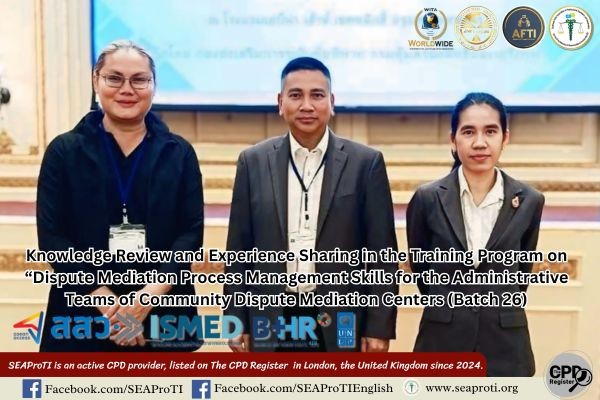Why You Should Use a Certified Translator from
A Professional Association for Court Document Translation
22 June 2025, Bangkok — Section 41 of the Thai Civil Procedure Code clearly states:
“All procedures concerning the trial and adjudication of civil cases conducted by the court shall be carried out in the Thai language.”
Full text of Section 46:
“Section 46 All procedures concerning the trial and adjudication of civil cases conducted by the court shall be carried out in the Thai language.
All pleadings, documents, or papers containing any statements or prepared by the court or court officers as part of the case file must be written in the Thai script and written, printed, or typed in ink. If any part is incorrect or illegible, it shall be crossed out and rewritten, with the author signing to certify the correction. If any additions are made, they must be written at the end of the line or in a clearly designated area and signed accordingly.
If any original document or paper submitted to the court is in a foreign language, the court shall order the party submitting the document to provide a translation of the entire document or of only the essential parts, with a certification of the accuracy of the translation attached to the original.
If any party or person appearing before the court does not understand the Thai language, or is mute or unable to read and write, the relevant party shall be responsible for arranging an interpreter.”
This means that any documents or statements submitted in court must be in Thai. If the original document is in a foreign language, the court will order it to be translated into Thai and require a certified statement of accuracy to be attached to the original.
No Legal Requirement for Translator Qualifications in Thai Law
While the law lays out procedures for document translation, it notably does not specify any qualifications for translators. This implies that anyone — regardless of language proficiency or translation training — could potentially translate documents for court use, as long as there is no system in place to verify or vet the translator’s competence.
This legal gap creates serious risks. A simple mistranslation could directly impact a party’s rights and the outcome of a legal proceeding.
So how can we ensure the translation is accurate?
The answer: Use a “Certified Translator” and “Translation Certifier” recognized by SEAProTI, or a similarly credible professional association.
SEAProTI — the Southeast Asian Association of Professional Translators and Interpreters — has an internationally recognized certification system. Translators certified by SEAProTI must:
- Undergo training and pass professional qualification exams
- Receive an official license to practice in the name of the association
- Operate under the association’s bylaws registered in accordance with the Thai Civil and Commercial Code
- Be subject to monitoring, quality assurance, and possible license revocation if ethical violations occur
The Hidden Risks of Using Unqualified Translators in Civil Cases: Don’t Let a Translation Jeopardize Your Legal Rights
Many people view translation as a simple act of converting words from one language to another. But when documents are submitted as evidence in court, even the smallest translation error can have serious consequences—ones that may alter the entire course of a legal case and impact the lives of the parties involved.
A single mistranslated word can lead to legal disadvantage, misinterpretation by the judge, or the loss of legal rights that one is otherwise entitled to. This isn’t just about communication; in the courtroom, a translation becomes evidence—a crucial part of how justice is delivered.
The risks go beyond mere misunderstanding. Inaccurate translations that distort the facts may result in criminal charges for submitting false documents or even be deemed an act of deception toward the court. Worse yet, such actions can constitute a breach of legal ethics and lead to criminal liability under Thai law.
Although Section 46 of the Thai Civil Procedure Code requires that all documents in civil proceedings be in the Thai language and that foreign-language documents be translated for court use, it does not specify any qualifications or licensing requirements for translators. This legal ambiguity opens the door to serious risks if translations are handled by individuals with no language training or understanding of legal contexts.
To avoid such risks, the safest and most credible approach is to use a Certified Translator and Translation Certifier recognized by a reputable professional body, such as the Southeast Asian Association of Professional Translators and Interpreters (SEAProTI). SEAProTI maintains rigorous standards, including professional training, licensing, and ethical oversight to ensure both accuracy and accountability in legal translation.
Never underestimate the power of a translation. In the courtroom, it is not merely a communication tool—it is documentary evidence with legal force. Accuracy is not optional, and the translator’s credibility is your strongest safeguard in the pursuit of justice.
Conclusion
“A translation is evidence in court. A minor mistranslation can shift the course of a case.”
Although Thai law does not legally require translators to hold a license, in practice, accuracy, credibility, and legal recognition are critical. For this reason, choosing a SEAProTI-certified translator is the most secure and appropriate option for litigants, legal counsel, and judges alike.
SEAProTI’s certified translators, translation certification providers, and certified interpreters:
The Southeast Asian Association of Professional Translators and Interpreters (SEAProTI) has officially announced the criteria and qualifications for individuals to register as “Certified Translators,” “Translation Certification Providers,” and “Certified Interpreters” under the association’s regulations. These guidelines are detailed in Sections 9 and 10 of the Royal Thai Government Gazette, issued by the Secretariat of the Cabinet under the Office of the Prime Minister of the Kingdom of Thailand, dated July 25, 2024, Volume 141, Part 66 Ng, Page 100.
To read the full publication, visit the Royal Thai Government Gazette
ทำไมการแปลเอกสารเพื่อใช้ในศาล ควรเลือกนักแปลที่ได้รับการรับรองจากสมาคมวิชาชีพ
22 มิถุนายน 2568, กรุงเทพมหานคร – มาตรา 41 แห่งประมวลกฎหมายวิธีพิจารณาความแพ่ง กำหนดชัดเจนว่า
- “กระบวนการพิจารณาและการชี้ขาดคดีแพ่งในศาล ต้องดำเนินการเป็นภาษาไทย”
“มาตรา 46 บรรดากระบวนพิจารณาเกี่ยวด้วยการพิจารณาและการชี้ขาดตัดสินคดีแพ่งทั้งหลายซึ่งศาลเป็นผู้พิจารณานั้น ให้ทำเป็นภาษาไทย
บรรดาคำคู่ความและเอกสารหรือแผ่นกระดาษไม่ว่าอย่างใด ๆ ที่มีข้อความหรือศาลหรือเจ้าพนักงานศาลได้ทำขึ้นซึ่งประกอบเป็นส่วนของคดีนั้น ให้เขียนเป็นหนังสือไทยและเขียนด้วยหมึกหรือพิมพ์หรือถ่ายพิมพ์ ถ้ามีข้อความที่ใดหามิได้ให้ขีดลบออก แต่ให้ขีดคำเสียแล้วเขียนลงใหม่ และผู้เขียนต้องลงชื่อไว้รับรอง ถ้ามีข้อความเพิ่มเติมให้ผู้เขียนเติมลงท้ายชื่อ หรือจะเขียนไว้ในที่สำคัญ
ถ้าต้นฉบับเอกสารหรือแผ่นกระดาษไม่ว่าอย่างใด ๆ ที่ส่งต่อศาลได้ทำขึ้นเป็นภาษาต่างประเทศ ให้ศาลสั่งคู่ความฝ่ายที่ส่งให้ทำคำแปลทั้งฉบับหรือเฉพาะแต่ส่วนสำคัญ โดยมีคำรับรองมายืนยันแปลไว้กับต้นฉบับ
ถ้าคู่ความฝ่ายใดหรือบุคคลใดที่มาศาลไม่เข้าใจภาษาไทยหรือเป็นใบ้หรืออุทานวก และอ่านเขียนหนังสือไม่ได้ ให้ให้คู่ความฝ่ายที่เกี่ยวข้องจัดหาล่าม“
นั่นหมายความว่า เอกสารหรือคำคู่ความใด ๆ ที่เกี่ยวข้องกับคดี ต้องจัดทำเป็นภาษาไทยเท่านั้น หากเอกสารนั้นเป็นภาษาต่างประเทศ ศาลจะมีคำสั่งให้แปลเป็นภาษาไทย พร้อมแนบคำรับรองความถูกต้องของคำแปลในต้นฉบับ
ไม่มีข้อกำหนดเรื่องคุณสมบัตินักแปลในกฎหมายไทย
แม้กฎหมายจะระบุขั้นตอนเกี่ยวกับการแปลเอกสารไว้อย่างชัดเจน แต่สิ่งที่น่าสังเกตคือ
- ไม่มีกฎหมายใดกำหนดคุณสมบัติของผู้แปลเอกสารเพื่อใช้ในศาล
นั่นหมายความว่า ใครก็สามารถแปลเอกสารเพื่อยื่นศาลได้ ไม่ว่าจะมีความรู้ด้านภาษาหรือไม่ หากไม่มีระบบตรวจสอบหรือการคัดกรองที่เข้มงวด อาจทำให้เกิดข้อผิดพลาดที่ส่งผลกระทบต่อสิทธิของคู่ความในกระบวนการยุติธรรม
แล้วเราจะมั่นใจได้อย่างไรว่าคำแปลถูกต้อง
คำตอบคือ: เลือกใช้ “นักแปลรับรอง” และ “ผู้รับรองการแปล” ของ SEAProTI หรือจากนักวิชาชีพจากสมาคมวิชาชีพที่น่าเชื่อถือได้ทั่วโลก แต่ทำไมต้องเลือกนักวิชาชีพจากสมาคมวิชาชีพนักแปลและล่ามแห่งเอเชียตะวันออกเฉียงใต้ (SEAProTI)
สมาคมวิชาชีพนักแปลและล่ามแห่งเอเชียตะวันออกเฉียงใต้มีระบบรับรองที่น่าเชื่อถือและเป็นที่ยอมรับในระดับสากล โดยนักแปลที่ผ่านการรับรองต้อง:
- ผ่านการอบรมและสอบความรู้ตามมาตรฐานวิชาชีพ
- ได้รับ ใบอนุญาตปฏิบัติหน้าที่ในนามสมาคม
- อยู่ภายใต้ข้อบังคับของสมาคมที่จดทะเบียนถูกต้องตาม ประมวลกฎหมายแพ่งและพาณิชย์
- มีระบบ ติดตาม ตรวจสอบ และเพิกถอนใบอนุญาต หากพบพฤติกรรมที่ขัดต่อจริยธรรมวิชาชีพ
ความเสี่ยงจากการใช้ผู้แปลที่ไม่มีคุณสมบัติในคดีความ: อย่าปล่อยให้คำแปลทำลายคดีของคุณ
หลายคนอาจมองว่าการแปลภาษาเป็นเพียงการแปลให้เข้าใจ แต่หากเอกสารเหล่านั้นต้องใช้เป็นหลักฐานในศาล ความผิดพลาดเพียงเล็กน้อยก็อาจนำไปสู่ผลกระทบร้ายแรงถึงขั้นเปลี่ยนทิศทางของคดี และส่งผลต่อชีวิตของคู่ความโดยตรง
คำแปลที่ผิดเพียงคำเดียว อาจทำให้คุณเสียเปรียบในกระบวนการพิจารณา ศาลเข้าใจข้อมูลคลาดเคลื่อน หรือแม้แต่ทำให้คุณสูญเสียสิทธิที่ควรได้รับตามกฎหมาย นี่ไม่ใช่เรื่องเล็กน้อย เพราะเมื่อเอกสารที่แปลถูกนำไปใช้ในศาล มันไม่ใช่แค่การสื่อสาร แต่คือ “หลักฐาน” ที่จะถูกใช้ประกอบการพิจารณาและตัดสินคดี
ความเสี่ยงยังไม่จบแค่นั้น เพราะหากการแปลมีความคลาดเคลื่อนจนทำให้เนื้อหาบิดเบือนความจริง คุณอาจถูกฟ้องในข้อหาใช้เอกสารเท็จ หรือเข้าข่ายกระทำการฉ้อฉลต่อศาล ที่สำคัญยังอาจถือเป็นการฝ่าฝืนจริยธรรมในกระบวนการยุติธรรม และนำไปสู่การรับโทษตามกฎหมายอาญา
แม้กฎหมายไทยโดยเฉพาะ มาตรา 46 แห่งประมวลกฎหมายวิธีพิจารณาความแพ่ง จะกำหนดให้เอกสารในคดีแพ่งต้องจัดทำเป็นภาษาไทย และให้มีการแปลเอกสารต่างประเทศเพื่อใช้ในศาล แต่กลับไม่ได้ระบุว่าผู้แปลต้องมีคุณสมบัติหรือใบอนุญาตแต่อย่างใด ช่องโหว่นี้ทำให้เกิดความเสี่ยงที่คู่ความจะใช้ผู้แปลที่ไม่มีความรู้หรือจริยธรรมวิชาชีพอย่างแท้จริง
เพื่อหลีกเลี่ยงความเสียหายเหล่านี้ ทางเลือกที่ปลอดภัยที่สุดคือ การใช้บริการ “นักแปลรับรอง” และ “ผู้รับรองการแปล” จากสมาคมวิชาชีพที่เชื่อถือได้ เช่น สมาคมวิชาชีพนักแปลและล่ามแห่งเอเชียตะวันออกเฉียงใต้ (SEAProTI) ซึ่งมีระบบคัดกรอง อบรม และออกใบอนุญาตอย่างเป็นทางการ พร้อมกลไกตรวจสอบจริยธรรมและการควบคุมคุณภาพ
อย่ามองคำแปลว่าเป็นแค่คำพูด เพราะเมื่อเข้าสู่ศาล คำแปลคือ “พยานเอกสาร” ที่มีผลทางกฎหมายโดยตรง ความถูกต้องจึงเป็นเรื่องที่ไม่ควรมองข้าม และความน่าเชื่อถือของผู้แปลคือเกราะคุ้มกันที่ดีที่สุดในกระบวนการยุติธรรม
บทสรุป
“คำแปลคือ หลักฐานในศาล ความผิดพลาดเพียงเล็กน้อยในคำแปล อาจเปลี่ยนทิศทางของคดี”
แม้กฎหมายจะไม่กำหนดให้นักแปลต้องมีใบอนุญาต แต่ในทางปฏิบัติ หากต้องการความถูกต้อง ความน่าเชื่อถือ และการยอมรับในกระบวนการยุติธรรม การเลือกใช้ นักแปลรับรองของ SEAProTI คือทางเลือกที่ปลอดภัยและเหมาะสมที่สุด — ทั้งสำหรับคู่ความ ทนายความ และผู้พิพากษา
เกี่ยวกับนักแปลรับรอง ผู้รับรองการแปล และล่ามรับรองของสมาคมวิชาชีพนักแปลและล่ามแห่งเอเชียตะวันออกเฉียงใต้
สมาคมวิชาชีพนักแปลและล่ามแห่งเอเชียตะวันออกเฉียงใต้ (SEAProTI) ได้ประกาศหลักเกณฑ์และคุณสมบัติผู้ที่ขึ้นทะเบียนเป็น “นักแปลรับรอง (Certified Translators) และผู้รับรองการแปล (Translation Certification Providers) และล่ามรับรอง (Certified Interpreters)” ของสมาคม หมวดที่ 9 และหมวดที่ 10 ในราชกิจจานุเบกษา ของสำนักเลขาธิการคณะรัฐมนตรี ในสำนักนายกรัฐมนตรี แห่งราชอาณาจักรไทย ลงวันที่ 25 ก.ค. 2567 เล่มที่ 141 ตอนที่ 66 ง หน้า 100 อ่านฉบับเต็มได้ที่: นักแปลรับรอง ผู้รับรองการแปล และล่ามรับรอง


